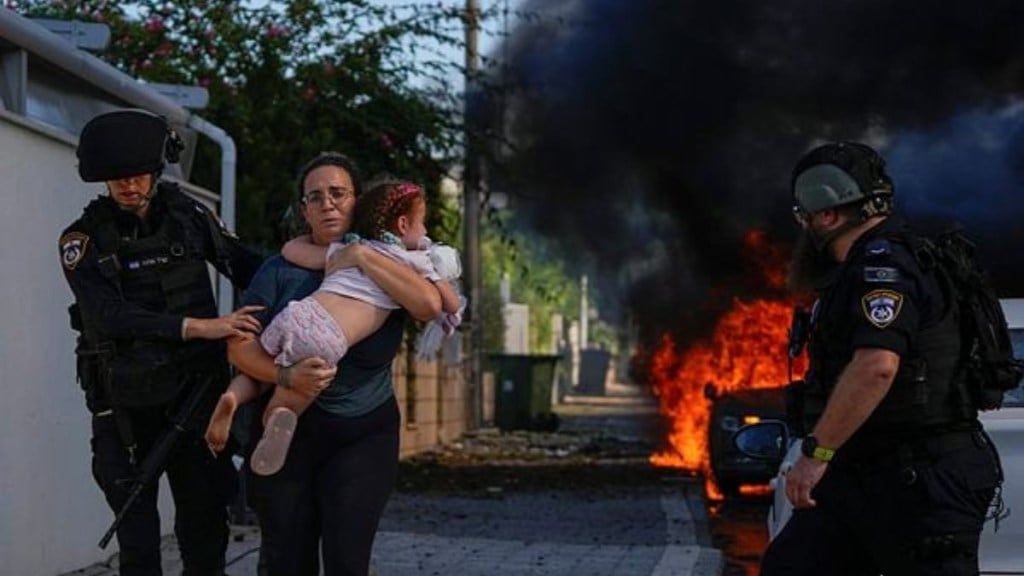The United Nations and multiple humanitarian organizations have issued a collective plea for an immediate humanitarian ceasefire in Gaza, underscoring the imperative to safeguard civilian lives and ensure access to essential resources.
Leaders of 11 United Nations agencies and six humanitarian groups have joined forces to make a unified appeal for a humanitarian ceasefire in Gaza. In a statement released on Sunday night, they stressed the need to protect civilians and ensure rapid availability of crucial resources such as food, water, medicine, and fuel.
The heads of the Inter-Agency Standing Committee overseeing the situation in Israel and the Occupied Palestinian Territory deplored the shocking October 7 attacks by Hamas, which included the killing and hostage-taking of Israelis. They further condemned the loss of civilian lives in Gaza, as well as the denial of basic necessities such as food, water, medicine, electricity, and fuel to 2.2 million Palestinians.
The United Nations and humanitarian organizations emphasize that more than 23,000 injured individuals urgently require medical attention, while hospitals are overwhelmed.
The joint statement pointed out that an entire population in Gaza is besieged and under attack, facing restricted access to vital resources and suffering bombings in their homes, shelters, hospitals, and places of worship.
Additionally, the statement drew attention to the toll on aid workers, with numerous casualties since October 7, including 88 colleagues from the United Nations Relief and Works Agency (UNRWA). This marks the highest number of United Nations fatalities recorded in a single conflict. The collective appeal calls for the immediate and unconditional release of all civilian hostages and demands the protection of civilians and the essential infrastructure they rely on, including hospitals, shelters, and schools.
Meanwhile, Gaza has endured its third total communications blackout since the Israeli offensive began following the October 7 attacks. Palestinian communications company Paltel announced that all “communication and internet services” were once again down. The Internet access advocacy group, NetBlocks.org, confirmed that communications were severely restricted in the besieged enclave.
Despite continued appeals from the United States for Israel to initiate a humanitarian pause in its relentless bombardment of Gaza and escalating civilian casualties, Israeli airstrikes on Sunday struck two refugee camps in the central Gaza Strip, resulting in at least 53 fatalities and numerous injuries, according to multiple reports.
The Palestinian death toll in the Israel-Hamas conflict has now exceeded 10,000, with over 4,000 of those being children and minors, according to the Hamas-run Health Ministry in Gaza. In the occupied West Bank, more than 140 Palestinians have lost their lives in the violence and Israeli raids.
US Secretary of State Antony Blinken made an unannounced visit to Ramallah in the West Bank for a meeting with Palestinian President Mahmoud Abbas. Blinken later travelled to Baghdad for discussions with Iraqi Prime Minister Mohammed Shia al-Sudani. On Saturday, Blinken held talks with Arab foreign ministers in Jordan and met with Israeli Prime Minister Benjamin Netanyahu. Netanyahu has insisted on no temporary ceasefire until all hostages held by Hamas are released, though President Joe Biden suggested progress was being made toward a humanitarian pause.
Over 1,400 people in Israel have lost their lives, with the majority of fatalities resulting from the October 7 Hamas attack that initiated the conflict. As reported earlier, additionally, the militant group took 242 hostages from Israel into Gaza.
Approximately 1,100 people have left the Gaza Strip through the Rafah crossing since last Wednesday, seemingly as part of an agreement involving the United States, Egypt, Israel, and Qatar, which mediates with Hamas.
Simultaneously, the US military has acknowledged positioning a nuclear-capable submarine in the Middle East. While providing no additional details in its online statement on Sunday, an image posted appeared to show a submarine in Egypt’s Suez Canal near the Suez Canal Bridge.
Acknowledgment of the location of an Ohio-class submarine is exceedingly rare, as they constitute a part of America’s “nuclear triad,” which also includes land-based ballistic missiles and nuclear bombs aboard strategic bombers. Some Ohio-class submarines are equipped with cruise missiles and the capability to deploy with special operations forces, making it uncertain whether the submarine in the Middle East carries nuclear ballistic missiles. The U.S. has previously deployed submarines to the region during periods of heightened tensions with Iran. Central Command separately released an image of a nuclear-capable B-1 bomber also operating in the Middle East on Sunday.
The United Nations and leaders of aid organizations have reported over a hundred attacks on healthcare facilities, with 88 staff members from the U.N. agency for Palestinian refugees, UNRWA, having been killed, marking “the highest number of United Nations fatalities ever recorded in a single conflict.”
Jordan’s King Abdullah II announced the airdrop of medical aid into Gaza via a Jordanian military cargo aircraft. This marks a significant step, as humanitarian aid had only trickled into Gaza through its land border with Egypt before this development. Jordan, a key U.S. ally with a peace deal with Israel, has expressed its commitment to providing assistance to the injured in the Gaza conflict.
In response to the crisis, King Abdullah II has recalled Jordan’s ambassador to Israel and instructed Israel’s envoy not to return to Jordan until the situation in Gaza is resolved.
Additionally, Iran’s Supreme Leader, Ayatollah Ali Khamenei, held a meeting with Hamas leader Ismail Haniyeh. The meeting’s date was not disclosed in the report, but Khamenei praised the resilience of the people of Gaza and emphasized Iran’s support for the Palestinians in their conflict with Israel. Khamenei urged Islamic nations and international organizations to take substantial actions in support of the people of Gaza.
It’s worth noting that Israel has accused Iran of destabilizing the region by providing support to proxies like Hamas and the Hezbollah group in Lebanon.

